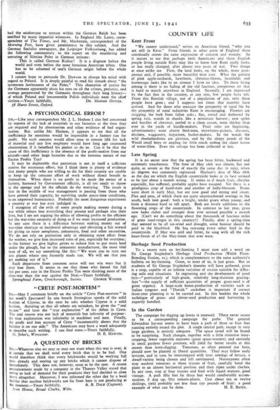A PSYCHOLOGICAL ERROR ?
Ste,—Like your correspondent Mr. J. L. Hodson I also feel concerned by reports of the lack of materials in our factories at the time they are required and by absenteeism and other evidence of bad organ- isation. But, unlike Mr. Hodson, it appears to me that all the inefficiency he mentions would be impossible in a factory run for profit. No such concern would allow men to remain idle for lack of material and any live employer would have long ago countered absenteeism if it benefited his pocket to do so. Can it be that the cause of this inefficiency is the absence of the profit-motive from our aircraft—and other large factories due to the extreme nature of our Excess Profits Tax?
It may be deplorable that patriotism is not in itself a sufficient motive for strenuous effort, but I think there is plenty of evidence that many people who are willing to die for their country are unable to keep up the constant effort of work without direct benefit to themselves. When there is no profit to be made the owner of a factory, harassed by Government officials, is all too ready to throw in the sponge and let the officials do the worrying. The result is that in the middle of war management is passing from those who have proved their capacity, by surviving under peace-time conditions, to an unproved bureaucracy. Probably the most dangerous experiment a country at war has ever indulged in.
I recognise all the evils of some people making money during a war while others lose everything they possess and perhaps also their lives, but I am not arguing the ethics of allowing profits to the efficient but the war-time necessity of doing so if we want increased production. In any case there is a difference between making money out of war-time shortage or incidental advantage and obtaining a fair reward for giving us more aeroplanes, armaments, food and other necessities. We do not rely on patriotism only in obtaining more effort from the worker, we give him increased rates of pay, especially for overtime; to the farmer we give higher prices to induce him to put more. land under the plough, but to the armament manufacturer, the most vital man of all, we say something like this:" We want you to turn out zoo planes where you formerly made too. We will see that you get nothing' out of it."
Such departures from common sense will not win wars but it may lose them. It seems to me that those who forced the full too per cent. rate in the Excess Profits Tax were thinking more of the class-war than the war against the Nazi.—Yours faithfully,
Springhead Farm, Crowborough, Sussex. GEORGE WINDER.


























 Previous page
Previous page